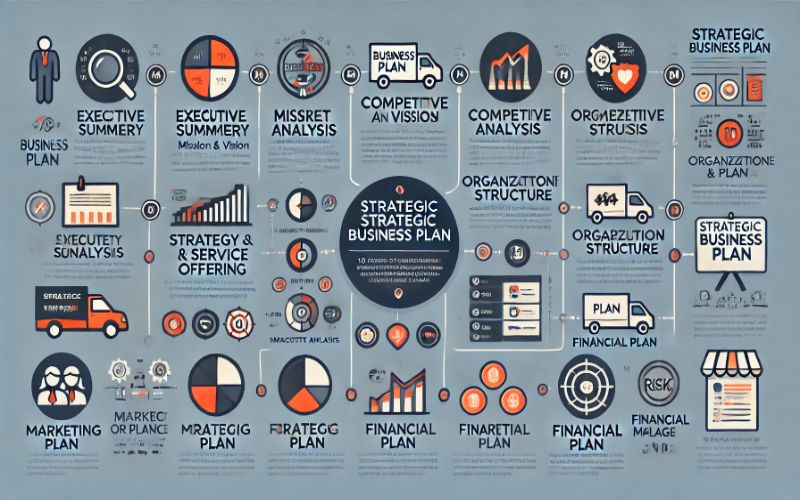Sep 12
Comprehensive Strategic Business Plan for Real Estate Pros
In the fast-paced world of real estate, where market conditions can change instantly, a well-structured business plan is not just a necessity but a key to sustainable success. It's a roadmap that guides real estate professionals through the industry's intricacies. This blog takes a deep dive into the strategic aspects of business strategic planning in real estate, providing insights and practical tips to help you craft a comprehensive plan that can propel your business to new heights.
Importance Of Business Planning Strategic
A business plan is more than just a document. It's a strategic tool that helps you define your goals, assess your strengths and weaknesses, and chart a course for growth. In real estate, a detailed business plan can help you
- Identify Target Markets: Pinpoint the demographics and locations that offer the best growth opportunities.
- Set Clear Objectives: Establish measurable sales, market share, and client satisfaction goals.
- Develop Effective Strategies: Create actionable plans for marketing, lead generation, and client retention.
- Manage Finances: Outline financial goals and strategies for budgeting, cash flow management, and investment.
10 Key Components Of A Strategic Business Plan
The most important steps of a successful business plan include:

Craft Your Executive Summary
The executive summary is the cornerstone of your strategic business plan, offering a concise yet comprehensive overview of your entire strategy. This section should briefly present your business's mission, vision, and key objectives, providing potential investors, partners, or stakeholders with a snapshot of what your business aims to achieve and how it plans to get there. Crafting this summary with clarity and impact is crucial, as it often serves as the first impression of your business plan. Highlight the unique aspects of your business, such as its innovative approach, competitive advantages, or the specific market needs it addresses.
In addition to presenting your business's mission and objectives, the executive summary should briefly touch on the core components of your strategy, including market analysis, target demographics, and financial projections. This section should be compelling enough to capture the reader's interest and encourage them to explore the rest of your plan in more detail. By clearly outlining your business's goals and the roadmap for achieving them, the executive summary sets the stage for more detailed information.
Define Your Business
The business description section provides a detailed look at the nature of your business, giving readers a thorough understanding of what your company does and its value. This section should cover your specific services or products, your markets, and your business's overall structure. If your business operates in the real estate sector, this section could describe whether you focus on residential, commercial, or industrial properties and your property management, sales, or investment strategies.
Moreover, the business description should articulate your company's unique selling proposition (USP), which sets you apart from competitors. This could involve highlighting your expertise, superior customer service, innovative solutions, or any other competitive edge you possess. This section lays the groundwork for understanding your business's potential and strategic direction by clearly defining what it does and how it stands out in the marketplace.
Analyze Your Market
Understanding your competition requires a comprehensive market analysis. This market analysis should cover:
- Industry Overview: Discuss current trends in the real estate market and future projections.
- Target Market: Define your ideal clients and their needs. Include demographic data, buying behaviors, and preferences.
- Competitive Analysis: Identify your market competitors and analyze their strengths and weaknesses. Highlight opportunities for differentiation.
Structure Your Organization and Management
Outline your business structure and the team to help you achieve your goals. Include:
- Organizational Structure: Describe your business hierarchy and the roles and responsibilities of key team members.
- Management Team: Highlight the experience of your business strategic management team.
- Advisors and Consultants: Mention any external advisors or consultants who will contribute to your business success.
Develop Your Marketing Strategy
Developing a marketing strategy is crucial for attracting and retaining clients. To start, setting specific, measurable marketing goals that align with your business objectives is crucial. These goals should be clearly defined, whether it's increasing your brand awareness, generating leads, or driving sales, and they should be tracked regularly to ensure your efforts are on the right path. Equally important is identifying your target audience. Understanding your primary and secondary audiences allows you to design your messaging and marketing tactics to meet their needs and preferences, ensuring a more effective reach and engagement.
When developing your marketing strategy, prioritize strong branding and positioning. A clear brand identity distinguishes your business and communicates your unique value proposition to your audience, setting you apart from competitors. Once your brand identity is established, you can deploy various marketing tactics to connect with your audience. These include leveraging the Internet and social media for digital outreach, sending targeted physical mail for a personal touch, and participating in social gatherings or events to build relationships. By combining these elements, your marketing strategy will attract new clients and foster long-term loyalty.
Build Your Sales Strategy
Your sales strategy must explain how you will turn potential leads into clients. Include:
- Sales Goals: Set targets for the number of properties sold or leased, revenue generated, and market share.
- Sales Process: Describe your sales process, from lead generation to closing deals.
- Client Relationship Management: Detail how you'll manage and sustain client relationships to encourage repeat business and referrals.
Plan Your Financial Strategy
A solid financial plan is crucial for sustaining your business. Include:
- Budget: Create a detailed budget plan that covers all aspects of your business operations, including marketing, salaries, and office expenses.
- Cash Flow Projections: Provide projections for cash inflow and outflow over the next year or more.
- Funding Requirements: If you need external funding, specify the amount required and how you plan to use it.
- Financial Statements: Include projected income statements, balance sheets, and cash flow statements.
Risk Management
Risk management is an essential aspect of any strategic business plan, encompassing the identification, assessment, and mitigation of potential threats that may affect the success of the business. This section should outline the key risks your business may face, such as market volatility, economic downturns, or changes in legal and regulatory frameworks. For example, in a real estate business, risks could include fluctuations in property values, interest rate changes, or unexpected maintenance costs.
Once these risks are identified, the plan should detail your business's strategies to manage and mitigate them. This could involve diversifying your investment portfolio, securing insurance policies, or implementing contingency plans for economic downturns. Effective risk management helps protect your business from potential setbacks and demonstrates to stakeholders that you are prepared to handle challenges proactively and effectively.
Streamline Your Operations
Your operational plan should detail the day-to-day activities required to run your business. Include:
- Location and Facilities: Describe your business location and any facilities you use.
- Technology and Equipment: Detail the technology and equipment you'll need to operate efficiently.
- Processes and Procedures: Mention the processes and procedures you'll implement to ensure smooth operations and high-quality service.
Measure Your Performance

Establishing performance metrics is essential for tracking the success of your business plan and ensuring that your strategies are effective. Key performance indicators (KPIs) provide measurable benchmarks that can be used to assess various aspects of your business, such as sales growth, client satisfaction, and financial health. For instance, in a real estate business, KPIs might include occupancy rates, rental yield, or return on investment (ROI).
By regularly monitoring these performance metrics, you can gain valuable insights into how well your business is performing and identify areas that may require adjustment. This section of your plan should specify the KPIs most relevant to your business goals, how they will be measured, and the frequency of these assessments. Implementing a robust system for tracking and analyzing performance metrics ensures that your business stays on course and continues to achieve its strategic objectives.
Final Thoughts: Elevate Your Real Estate Business with a Strategic Plan
A well-crafted business plan is vital for real estate professionals looking to achieve long-term success. When you plan your business strategically, you'll be able to understand the ins and outs of the real estate market, make the most of opportunities, and create a successful business.
Remember, your business plan is a living document that should evolve as your business grows and the market changes. Regularly update it to reflect new goals, strategies, and market conditions to remain relevant and effective.
If you're looking for more valuable resources to support your real estate investing journey, check out Strategic Success Consulting. We offer a wide range of content and coaching programs tailored to help you sharpen your skills, develop winning strategies, and fast-track your real estate investment success.
Frequently Asked Questions
How To Implement And Monitor Your Business Plan Strategy?
Creating a business plan is the first step; implementation and monitoring are equally important. Develop an action plan that outlines the steps you'll take to achieve your goals and assign responsibilities to team members. Regularly review your progress and make adjustments as needed to stay on track.
What Strategic Plan Is Important For A Successful Business?
A strategic plan is essential for setting your company’s long-term vision and outlining its path. By aligning your short-term goals and actions with these broader objectives, you gain a clear direction for your organization. This approach ensures that your teams are focused on the most impactful projects, driving your business toward its desired future.
COACHING
Service is at the heart of everything we do at Strategic Success Consulting. You'll experience the difference when you talk to our associates, and you'll see the difference that exceptional makes in your learning journey. Book a Discovery Call for more information!
COURSES
We offer Strategies, Courses, Modules and Deep Dives to help support you throughout your business or real estate investing journey.
EVENTS
Come check out our Strategic Entrepreneur Networking events in person or online! We also host webinars, workshops and other events that you can find on our events calendar!
ABOUT US
At Strategic Success Consulting we uphold an ongoing commitment to providing an elevated level of personal service. Our clients come first, and as a result, they are able to achieve more than they ever dreamed with their business and/or real estate investing.
Copyright © 2024 Strategic Success Consulting Inc. All rights reserved.
